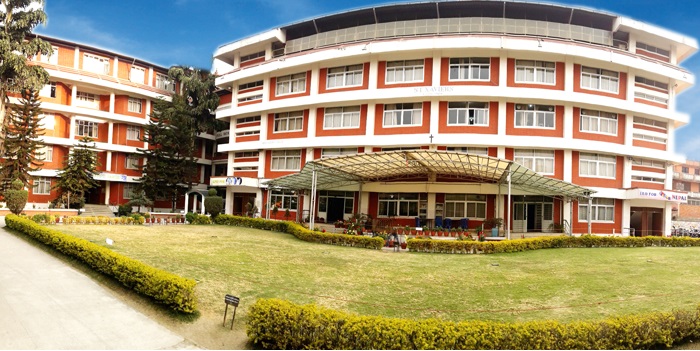Today (3 Dec), marking the 33rd year of St Xavier’s College, also the Feast Day of its patron St Francis Xavier, nostalgia takes over. When I first serendipitously made my way past the entrance of St Xavier’s College, the only intent lingering in my mind was to get through with my application process as soon as possible. Excepting the obvious visual aesthetics, not much stood out to me in the bustling crowd of students, all of them sporting their identity cards. I was yet to comprehend why the college was one of the most sought after in the country. One major question among the many that sprung up in my head was, “What is so special about this place?” What a thing curiosity is, because for me there was a cornucopia of an educational system to unravel.
St Xavier’s College, like several other institutions in Nepal, run by the Nepal Jesuit Society has been educating young adults since 1988 AD. The educators of the college, Jesuits, adhere closely to the Ignatian pedagogical paradigm which is a practical teaching framework that propels scholars toward their holistic growth. Objectives that the Jesuit education, especially higher education aims to attain are to be able to instill in the subjects several values that are of utmost necessity in their lives. Values such as striving for one’s intellectual competence, a loving nature along with the possession of attributes such as having an openness to growth, spiritual faith, paired with a deep commitment to pursuing justice are the pivotal ones that students who undergo Jesuit Education imbibe. Their approach transcends beyond academic excellence and efforts are made to mold young students into value-oriented individuals with enhanced zeal to make a positive mark in their lives and communities.
Jesuit institutions are sporadically slandered with accusations of religious propagation. This couldn’t be farther from the truth as the history and rapport of their existence in Nepal since 1951 AD speaks for itself. Some of the key values that adorn Jesuit Higher Education are truly enriching and in every way transcend religion. CuraPersonalis, a Latin phrase for ‘care for the person’ is one of those values that focuses on the personal development in multidimensional ways inclusive of one’s mind, body and spirit. Magis, yet another Latin word meaning ‘more’ embodies the act of discerning the greater good, striving for excellence by becoming more of what one possibly can to do even more for the better. Arriving at a unity of mind and heart, ever enthusiastic to pursue justice for all, introspecting into oneself along with finding beauty and God in all things are some of the other beautiful values that the educational system emanates.
Dalit activists organize shirtless rally from Maitighar to New...

One of the most striking attributes of the college is the student community it houses. Considering the composition of the diversity of the students enrolled here, it truly feels like a mini-Nepal spanning Mechi to Mahakali. Although many scholars come to pursue their higher education from beyond the capital, there exists some inexplicable force that gravitates them to pronounce the institution their home. Thanks to the diversity, there is never a dull moment as there is always something new to learn or someone new to meet. The melting-pot scenario allows space for learning, unlearning, compassion, widened perspective, openness to diversity and foreign cultures. Owing to the geographical range from where the students arrive and to the rigorously tough examination bar to cross, the institution can boast to be harboring the crème de la crème of the nation who go on to their respective careers in their attempt to make a difference.
Further on, beyond the premises, the alumni body is a major component in getting the Jesuit values across, disseminating through their work. Instilling in them the Xavierian values as a student and thereafter propagating them onto their surroundings and communities, the alumni showcase the aftermath of their educational competency. The values ingrained may seem a little too abstract to be quantified or even stated, however, the presence of the ‘je ne sais quoi’ factor embodied in the students as well as the alumni is undoubtedly felt.
The Xavierian alumni have gone on to become leaders in their own areas claiming a significant place in various sectors of the country. A majority of the college’s high school students from the science programs have forayed into the profession of medical and engineering that amounts to a large number of alumni contributing to the nation in their own personal ways. A significant number have opted to plunge into bureaucracy and they too are making their mark in the avenues of law, finance, administration, diplomacy and many more. Fresh batches of scientists and technologists graduate every year heading to the Nepali job market in quenching their professional passion. Some contribute to the literary world while others hop on to careers in the development sectors to help uplift society concurrently winning their breads. Whatever the academic focus may be, the alumni, laden with the values crucial to achieve growth, have marched ahead in their lives to contribute to one’s family, community, and the nation causing a multi-dimensional reach and making valuable difference.
Comprising more than 800 Jesuit institutions in the world, the Nepali model is not much different from what is practiced beyond the frontiers. The academic models may vary depending on the geographical positioning, however, the education that is sought to be conferred is extraordinarily value-based and holistically enriching. Be it in the USA or the Philippines or Nepal, the Jesuit educational principles remain the same; shaping young minds to be the leaders of tomorrow, excel in their respective fields and pioneer in their societies.
How could an educational institution be any different from others simply owing to its Jesuit nature? Surely, there wouldn’t be much of a difference but for the fact that the Jesuit-run institutions offer quality education in a much more affordable amount. The relatively economical fee structure along with the provision of uncontested education allows students from all walks of life to be a part of this family regardless of their backgrounds. For those academically promising and struggling financially, the provision of scholarship schemes helps them tread their way through tertiary education.
Service is yet another factor that ubiquitously holds its presence in the educational system. Students are taught and thereafter directed to practice to be of service to another in any way possible. The extent of what they do in their lives is rather unfathomable, however, the educational system that binds the college includes rural immersion for all students as well as staff to understand life beyond the comforts of their usual habitats and possibly be of help in aiding the community one way or another. The students quite literally embody the Audrey Hepburn quote, “You have two hands, one for helping yourself, the other for helping others.”
Owing to the institution’s dedication to acquiring excellence, assuming leadership and extending their service, it has been able to educate scores of intellectually stimulated individuals that leave their alma mater toward greater pursuits in life eventually to contribute to the nation.
Being a part of the system, I found the little voice that I always had within me come forth; a new-found confidence that I could take on anything in the world. It is rather cumbersome to figure out what exactly helped me crawl out of my cocoon. Was it the encouraging smiles? Or the invisible hand that screamed, “Go on, make the leap. I’m right here to catch you.” I will probably never know what it was, but I am absolutely certain that it happened since assimilating in the value-driven culture. May this temple of an institution flourish furthermore in the days to come and may it be able to illuminate an even larger population of young minds with its light. For all the scholars who were, are and will be a part of this institution, my message to you in the quote of St Ignatius of Loyola, “Go forth, and set the world on fire.”






































